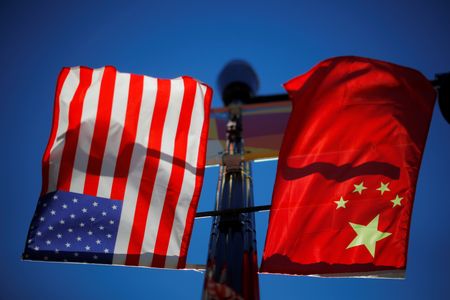By David Shepardson
WASHINGTON (Reuters) -The U.S. Congress is set to vote in the coming days on legislation restricting U.S. investments in China as part of a bill to fund government operations through mid-March, lawmakers said late on Tuesday.
In October, the Treasury finalized rules effective Jan. 2 that will limit U.S. investments in artificial intelligence and other technology sectors in China that could threaten U.S. national security.
The bill expands on those restrictions and also includes other provisions aimed at concerns about China, including a requirement to study national security risks posed by Chinese-made consumer routers and modems and mandate reviews of Chinese real estate purchases near additional national security-sensitive sites.
“China is an economic adversary and we must take bold action to safeguard our future against the Chinese Communist Party,” said Senator Bob Casey, a Democrat.
“This legislation takes bold action to restrict U.S. investments to stop our national security technology from getting into the hands of our adversaries before they can use it against us.”
The Chinese foreign ministry said the setting up of “artificial obstacles” to normal economic and trade exchanges disrupts the stability of global industrial and supply chains and was not in any party’s interest.
Spokesperson Lin Jian told reporters that China urges relevant U.S. politicians to stop politicizing and weaponizing economic and trade issues, and instead create the necessary conditions for economic and trade cooperation between the two countries.
The bill will also require the U.S. Federal Communications Commission to publish a list of every entity that both holds an FCC license or authorization and has any ownership by foreign adversarial governments, including China, to ensure the commission “knows when telecommunications and technology companies have a connection and foreign adversary.”
Washington is moving on a number of fronts to further restrict Chinese products.
An annual defense bill could ban China-based DJI and Autel Robotics from selling new drones in the United States market, while the Commerce Department is working to finalize rules in the coming weeks that would bar Chinese automakers from selling vehicles in the United States and bar China Telecom from U.S. operations.
Lawmakers have criticized major American index providers for directing billions of dollars from U.S. investors into stocks of Chinese companies that the U.S. believes are facilitating the development of China’s military.
The Treasury rules and legislation cover semiconductors and microelectronics, quantum information technologies and certain AI systems aimed at preventing investments in Chinese technologies like cutting-edge code-breaking computer systems or next-generation fighter jets.
Representative Rosa DeLauro, the top Democrat on the House Appropriations Committee, said “for years I have watched American dollars and intellectual property fuel the Chinese Communist Party’s technology and capabilities… This legislation builds on the regulations put into place this year by the Biden Administration, and sets the stage for continued bipartisan efforts to protect and rebuild our critical national capabilities.”
The outbound legislation covers technologies listed in the Treasury order and adds additional AI models that use some semiconductors, AI systems designed for exclusive military or government surveillance end use, hypersonic systems and additional export-controlled technologies.
(Reporting by David Shepardson; Additional reporting by Liz Lee in Beijing; Editing by Sonali Paul and Michael Perry)










